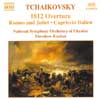Tchaiovsky 1812 overture
A colourful and overall enjoyable programme well worth its modest price
View record and artist detailsRecord and Artist Details
Composer or Director: Pyotr Ilyich Tchaikovsky
Genre:
Orchestral
Label: Naxos
Magazine Review Date: 13/2003
Media Format: CD or Download
Media Runtime: 66
Mastering:
Stereo
DDD
Catalogue Number: 8 555923

Tracks:
| Composition | Artist Credit |
|---|---|
| 1812 |
Pyotr Ilyich Tchaikovsky, Composer
Pyotr Ilyich Tchaikovsky, Composer Theodore Kuchar, Conductor Ukraine National Symphony Orchestra |
| Capriccio Italien |
Pyotr Ilyich Tchaikovsky, Composer
Pyotr Ilyich Tchaikovsky, Composer Theodore Kuchar, Conductor Ukraine National Symphony Orchestra |
| Romeo and Juliet |
Pyotr Ilyich Tchaikovsky, Composer
Pyotr Ilyich Tchaikovsky, Composer Theodore Kuchar, Conductor Ukraine National Symphony Orchestra |
| Marche slave, 'Slavonic March' |
Pyotr Ilyich Tchaikovsky, Composer
Pyotr Ilyich Tchaikovsky, Composer Theodore Kuchar, Conductor Ukraine National Symphony Orchestra |
| (The) Snow Maiden, Movement: Dance of the tumblers |
Pyotr Ilyich Tchaikovsky, Composer
Pyotr Ilyich Tchaikovsky, Composer Theodore Kuchar, Conductor Ukraine National Symphony Orchestra |
Author: Ivan March
Theodore Kuchar and the Ukraine Orchestra have already given us a highly recommendable Mussorgsky collection on Naxos and the present Tchaikovsky programme is very nearly as fine. Not only is the orchestral playing first class, but the recording is spectacular, with striking depth and resonance, with the percussion (notably, bass drum and cymbals) particularly telling.
Kuchar’s Capriccio Italien has genuine panache. After the arresting opening fanfare, he pulls back a little, without loss of tension, to present and develop the principal ‘echo’ theme warmly and elegantly, with affectionately turned violin decoration; yet at the close of the piece he whips up a thrilling accelerando and ends in a blaze of vigour.
Romeo and Juliet is less distinctive, the introduction played simply and directly, but without that special degree of poignant atmospheric anticipation which can grip the listener immediately. Yet Kuchar’s reading is well laid out, has genuine romantic feeling as the love theme expands, and a swelling of excitement at the climax of the devopement, helped by the brilliant and weighty Naxos sound. The ‘Tumblers’ dance vivaciously, to makes an appropriately light-hearted interlude, before Marche Slave brings another fine upbeat performance. The wit of the central section is relished, and leads to another dashing and rousing coda, powerfully underpinned with the Russian anthem.
After opening nobly and sonorously, 1812 generates plenty of thrust at the allegro, yet again Kuchar is able to relax to bring out the Russian colouring of the lyrical secondary themes, the violins singing out ardently, so that one wants to hum along. Kuchar then presses forward strongly to a very spectacular climax indeed. The closing melée is totally uninhibited, with the hugely resonant carillon all but dwarfing the canon fire. The sheer amplitude of the closing bars is sensational, as long as you don’t expect inner clarity!
Kuchar’s Capriccio Italien has genuine panache. After the arresting opening fanfare, he pulls back a little, without loss of tension, to present and develop the principal ‘echo’ theme warmly and elegantly, with affectionately turned violin decoration; yet at the close of the piece he whips up a thrilling accelerando and ends in a blaze of vigour.
Romeo and Juliet is less distinctive, the introduction played simply and directly, but without that special degree of poignant atmospheric anticipation which can grip the listener immediately. Yet Kuchar’s reading is well laid out, has genuine romantic feeling as the love theme expands, and a swelling of excitement at the climax of the devopement, helped by the brilliant and weighty Naxos sound. The ‘Tumblers’ dance vivaciously, to makes an appropriately light-hearted interlude, before Marche Slave brings another fine upbeat performance. The wit of the central section is relished, and leads to another dashing and rousing coda, powerfully underpinned with the Russian anthem.
After opening nobly and sonorously, 1812 generates plenty of thrust at the allegro, yet again Kuchar is able to relax to bring out the Russian colouring of the lyrical secondary themes, the violins singing out ardently, so that one wants to hum along. Kuchar then presses forward strongly to a very spectacular climax indeed. The closing melée is totally uninhibited, with the hugely resonant carillon all but dwarfing the canon fire. The sheer amplitude of the closing bars is sensational, as long as you don’t expect inner clarity!
Discover the world's largest classical music catalogue with Presto Music.

Gramophone Digital Club
- Digital Edition
- Digital Archive
- Reviews Database
- Full website access
From £8.75 / month
Subscribe
Gramophone Full Club
- Print Edition
- Digital Edition
- Digital Archive
- Reviews Database
- Full website access
From £11.00 / month
Subscribe
If you are a library, university or other organisation that would be interested in an institutional subscription to Gramophone please click here for further information.




